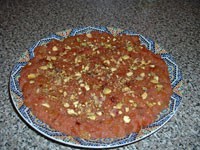Palestinian supergroup 47Soul stay true to their roots
Rob Garratt
Last month, something special happened. 47Soul – a supergroup uniting four alternative-music figureheads who share roots in Palestine – performed in the West Bank.
For the musicians, it was an emotional homecoming. Despite having rocked huge crowds across Europe – including at the UK’s Glastonbury Festival and Womad (World of Music, Arts and Dance) – the group’s headline slot on July 27 at the Palestine International Festival marked the first time the four members were permitted to perform their twisted electro take on the country’s street music to a native audience.
Why? Passports. The band members share Palestinian heritage – but due to population displacement, they are scattered and none have Palestinian Authority papers.
“It’s home, it’s the home that’s been banned for us to go to, or be in certain places, to be a part of it,” says singer Walaa Sbeit.
“We are Palestinians originally, all of us, with different passports and documents – and those documents put us in a position where we cannot perform where we are originally from.”
The “glue” of the band – which was formed in Jordan in 2013 and is now based in London – is Ramzy Suleiman, better known as electronic artist Z the People. He grew up in Washington DC but decided to trace his father’s roots, moving to Palestine to learn the Arabic quarter-tone keyboard.
He began working with Jordan-based acoustic folk-rapper Tareq Abu Kwaik. Better known as El Far3i, he is a former member of renowned Middle Eastern underground rock act El Morabba3 (The Square). He shared a flat with Hamza Arnaout, guitarist with rival Amman alt-rock act Autostrad, also known as El Jehaz.
The final piece of the puzzle is Sbeit, who has a background in theatre and poetry and also brings a reggae sensibility to the fold, as a former member of Palestine’s Ministry of Dub-Key.
Despite – or, rather, because of – their distinct musical backgrounds, together these four “brothers” have brokered a borderless, genre-less sound by focusing on the one thing they have in common – repurposing the region’s traditional dabke street dance into frenzied 21st-century electronica.
On the surface, 47Soul might recall Egypt’s electro-shaabi craze, but careful listening reveals a cosmopolitan blend, peppered with elements of hip-hop, rock and reggae. Politically charged but party-starting chants and raps fly in Arabic and English.
Listeners have called it “futuristic Levant wedding music”. The band call it “shamstep”. Whatever the name, this quixotic sound has translated easily to international audiences. Lead single Intro to ShamStep has clocked more than a million views on YouTube.
But reaching those audiences live has been problematic; visa issues mean many gigs have had to go ahead at the last minute, with just two of three of the members present. Much of the globe remains inaccessible. Abu Kwaik’s and Arnaout’s parents fled Palestine in 1948 and, as refugees, became Jordanian citizens, which can complicate European travel. Suleiman is an American, while Sbeit was raised in Haifa and holds an Israeli passport, which limits his ability to travel to the Arab world.
“We are stuck like Humpty Dumpty on the wall,” says Sbeit. But his humour hides darker existential issues associated with growing up as a citizen of an alien country, with limited rights and restricted freedom of movement into Palestine.
“My parents and grandparents were displaced from their home in 1948, and forced internally into what became Israel – internal refugees,” he says.
“I’m an indigenous minority – a Palestinian with an Israeli passport. It’s not fun to be a second-class citizen, to feel disenfranchised all the time, unwanted in your own homeland – that’s something that I don’t wish for anybody.” Unafraid to stand up for what he believes, Sbeit has clashed with Israeli authorities on a number of occasions. In June 2014 he was reportedly one of three activists arrested during direct action to reclaim his family’s historical Palestinian village of Igrit, close to the Lebanon border.
“This is one of many, many encounters,” he says, recalling instead a separate incident during which he was interrogated after performing politically sensitive material at a street festival.
“Very simply, we are activists,” he says. “We fight for equality, for being a normal human – and through that you try to do socially and politically conscious work.
“The Israeli system does not accept that, and you can easily be arrested, be accused of attacking officers, waging terror or violence – just by using lyrics and art and performance. This is something that every artist deals with as long as he wants to be not in the mainstream.”
Despite their often charged lyrics – the subject of checkpoints crop up more than once – 47Soul are wary of being defined by their individual politics. United, they do not want any single message to eclipse the infectious power of their music.
“A solo song by any one of us would be talking about the reason these checkpoints exist – and how we should rise up to make them not exist anymore,” says Abu Kwaik neatly.
“A 47Soul song would be about someone trying to meet a girl at a party – and getting stuck because of the checkpoint.
“We just want the world to dance to our sound – and then have a good political discussion after the show with the people you dance next to.”
“My goal for 47Soul,” adds Sbeit, with a laugh, “is to teach the world some new moves besides the Macarena.”
Source: www.thenational.ae


